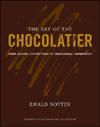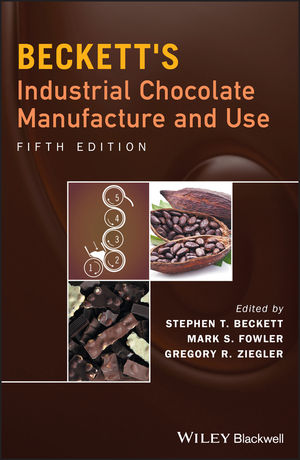Laura Secord comes home to Canada
Five years after bringing Laura Secord back to a Canadian-owned company, CEO Jean Leclerc talks about how his family’s company is working to revitalize and grown the brand.

Laura Secord has retail shops across Canada, which carry a full range of the brand's premium chocolates.

The Laura Secord facility in Quebec City, Canada means the Canadian brand is being made in the country where it was born.




Laura Secord Easter Eggs come off the line and drop into a bulk carton. The company pays special attention to its Easter packaging.

Moulded chocolates undergo several packaging operations before they are readied for shipment.

Laura Secord milk chocolate eggs are ready to be packaged for the upcoming holiday.


The Laura Secord brand has a strong nostalgic connection to Canadians.

Laura Secord shops feature ice cream counters that serve icre creams made with Nutriart inclusions.

Valentine's Day gift baskets line the shelves of a Laura Secord retail store in Quebec City, Quebec.

Laura Secord, which is named for a real woman, features her images in its packaging.

Customers at a Laura Secord shop in Quebec City, Quebec are greeted with samples as they enter the store.














It’s been five years since Jean Leclerc’s family bought the Laura Secord brand from Gordon Brothers LLC of Boston.
At the time, the move was cheered by Canadians happy to see the brand owned by a Canadian company again. The chocolate brand, which is more than 100 years old, is beloved in the country, and known for its retail shops and premium chocolate creations.
“Honestly, we had a quite a very important press coverage with that, because Laura Secord is a very, very old Canadian brand,” Leclerc recalls. “A lot of Canadians have an emotional connection with Laura Secord. A lot of people told me, ‘Oh I went there with my mother.’ And a lot of people have a nice story about our brand and our stores and our chocolate and this is very valuable.”
But in the years it was owned by Gordon Brothers, it had become a brand without its own manufacturing facility.
“It was owned by an American firm, so we brought back the company to Canada,” says Leclerc. “At that time it was like a virtual company, so no plant, no warehouse. “
And that’s where Leclerc's family comes in. They also own Nutriart, a bean-to-bar chocolate supplier, and therefore had the facilities to bring production back in house.
“We were a chocolate company without a brand, and Laura Secord was a brand without a plant,” Leclerc explains. “So I think it was a very, very nice fit and still is. Because it’s good to have a strong production capacity to sell to some industrial usage, but it’s also nice to have our own name to allow us to make some branded product as well and sell that to our store or other customers.”
They also decided to look at all the retail stores, and close the ones that needed to be close, open new ones and revamp existing locations that needed to be freshened up.
“We wanted to continue to develop the stores, of course, to change a little bit some store locations, some store configurations,” Leclerc says. “We built some new ones, we closed some.”
It’s a strategy that has included closing locations in struggling malls, and opening new ones in new complexes called lifestyle power centers.
“The retail business, it’s a changing business and it is important for us to follow the customer,” he says.
The company’s new and remodeled stores feature brighter colors, and attempt to create a “positive shopping experience.” And, the old-fashioned ice cream counters that rival the popularity of the brand’s chocolate now feature ice creams made with Nutriart inclusions.
Leclerc says they approach every store like it is its own different business.
“So we do not like to do one-size-fits-all. We try to specialize our stores,” he explains.
Another huge change has been a push to develop peanut-free products. In Canada there’s a vibrant market for the items, as most schools require everything to be peanut free. The company has even added a peanut-free building to the Nutriart campus.
“In Canada peanut-free is a huge, huge business,” he explains. “Five years ago, Laura Secord had zero peanut-free products, now we have probably 100 peanut-free products.”
They have also expanded into licensing, which helps spread out revenue from the chocolate company, which does a lot of its sales during the holidays.
“It is very, very seasonal. And it’s tough to sell chocolate in July,” Leclerc says.”So this is why the type of company we’ve put in place, where we have licensing, industrial, private label. So we have more than one way to do business. So it’s helps us, honestly.”
Laura Secordalso has moved full force into online sales and found an unexpected clientele — expatriates.
“It was amazing because we first set up [sales on our] website, it was for Canada, and the first call we got was someone in Florida saying, ‘Hey! How come I cannot order?,’ Leclerc says. “And then we have to call back IT because, very honestly, expats from California, Chicago, they like to order the food they used to eat and the way for them to get those items is through the website. It’s more complicated on the shipment though.”
The company is working to move the brand into the states, but Leclerc knows that’s an uphill battle.
“We want to sell in the USA, but it’s not known in the USA, and it’s very, very popular in Canada,” he says.
All in all, they’re happy with the changes they’ve been able to make with the company.
“To bring Laura Secord back was one thing, but to change Laura Secord was another thing,” Leclerc says. “And very honestly, it took me five years to change a lot of things.”
As for the next five years, Leclerc says he could see more retail stores and they also are looking at opening new locations in western Canada, where the previous owners closed the stores. However, he doesn’t want to be reckless.
“We want to make our store network right-sized, wel-managed, and we want to take care of the customer,” Leclerc says.
And, of course, all of this ties in heavily with Nutriart, which also is looking to expand into the U.S. market.
The company is a true bean-to-bar chocolate supplier, purchasing their own beans and following through on the entire process in the company’s 250,000-sq.-ft. manufacturing facility in Quebec City.
“The fact that we manufacture our own chocolate, it gives us an advantage, so when sell a product coated with chocolate, we coat it with our own chocolate,” Leclerc says. “So there’s no transportation, no packaging for the chocolate, and it’s easier for everybody because we make the chocolate, we use the chocolate.”
Of course, being bean-to-bar comes with a certain set of responsibilities, and while the company isn’t focused on using only Fair Trade cocoa at the moment, it does work personally with cocoa bean suppliers to make sure they’re getting an ethically sourced bean.
“We make sure that the partners we deal with about beans, they have the same values that we have,” Leclerc says. “It means good farming practices, no kids involved and so on. But for the moment it’s mostly through our partner, we trust them and we believe that they do what they tell us they are supposed to do.”
As for when, and if they’ll start using Fair Trade certified cocoa, which tends to be more expensive, Leclerc says, “Very honestly, my customer will decide.”
It’s that same train of thought that has led Nutriat to create a wide array of selections for any company looking for chocolate.
“First of all, we can ship bulk chocolate, like in a tanker. Then we could, if we don’t like to use bulk, make some little chocolate pieces, to allow you to melt the chocolate,” Leclerc explains. “Or, if you need inclusions, because you make muffins or you make ice cream or you make cookies, or you make granola bars, then we could make some inclusions for you, in any size you want.”
The facility also has the capacity to use chocolate to make other types of chocolate products, like moulded chocolate pieces, and they also do coating.
Leclerc knows Nutriart is smaller than some of its competitors, but they work to use their size to their advantage.
“We can make smaller batches, we can make special recipes and a small company like us, we have a way to do business that a large corporation can’t,” he explains. “When you’re smaller, you have some strength in weaknesses. And you have to understand that and try to see when you a little bit stronger because of your capacity to do different things, like speed to the market, and speed to react to special needs.”
Being small doesn’t mean they aren’t doing well though. Combined, Nutriart and Laura Secord do more than $100 million in business, Leclerc says.
“I think we are quite good in Quebec and Ontario, which is the two most important provinces for Canada,” he explains. “And we have some customers in the USA and of course our target for the next two or three years is to put a lot of effort into the U.S. Market. “
Sounds like a perfect goal for a brand that has a manufacturing plant, and a manufacturing plant that now has its own brand.
Read more about Quebec's Chocolate Scene:
Looking for a reprint of this article?
From high-res PDFs to custom plaques, order your copy today!
























